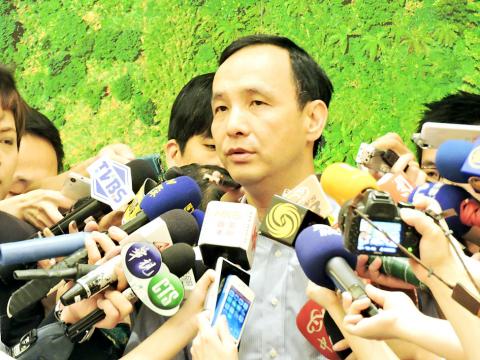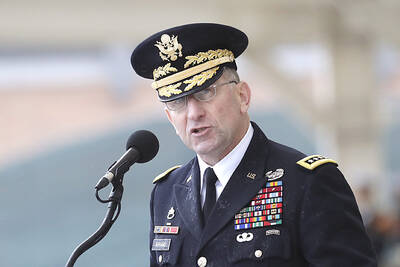Chinese Nationalist Party (KMT) Chairman Eric Chu (朱立倫) yesterday said that as the head of the party, he was obligated to “shoulder the responsibility” should KMT presidential candidate Hung Hsiu-chu (洪秀柱) drop out of the January race.
“As the head of the party, I must tell the truth, which was why I have met with Hung on more than two occasions to inform her of the results of some surveys and concerns voiced by people,” Chu, who is also the New Taipei City mayor, said on the sidelines of a city council meeting yesterday morning.
Chu said he had also advised the deputy legislative speaker to adjust her principles, attitude and ways of making public statements, since it was his responsibility to make mainstream public opinion known to the party’s presidential candidate.

Photo: Lai Hsiao-tung, Taipei Times
“I have always admired how Hung stands firm in her beliefs. She often says her own success and failure, or how many legislative seats the KMT secures in the Jan. 16 elections, are not her priority concerns. However, I think that is where communication is needed,” Chu said.
Chu said he had repeatedly asked Hung to take to heart the legislative elections, otherwise he would have no choice but to start taking care of the bigger picture.
“Hung asked me: ‘Who will take the responsibility [of representing the KMT in the presidential race] then?’ I replied: ‘As the chairman of the party, it would be my unshirkable responsibility and I am willing to shoulder all duties if necessary,’” Chu said.
Chu’s comments appear to contradict his previous statements that he would serve out his term as New Taipei City mayor and unite the KMT to support Hung, who won the party’s nomination in July after meeting its primary requirements.
They also came after a flurry of media reports on Monday that said he was planning to step down as mayor next week and vie for the presidency in Hung’s stead.
The presidential election is not all about conveying one’s values and beliefs, Chu said.
“As KMT chairman, I also have to factor in mainstream public opinion, the party’s survival and development, and the number of seats that its legislative candidates win,” he said.
Chu said that on Monday, he had informed President Ma Ying-jeou (馬英九), Vice President Wu Den-yih (吳敦義) and Legislative Speaker Wang Jin-pyng (王金平) about the latest developments on the issue.
“We will continue to communicate with interested parties in the following two days, in the hope of forging a consensus within the party,” he added.
Asked about the likelihood of him running for president without resigning as mayor, Chu declined to comment on a hypothetical question, saying only that communication is under way and that every discussion he has had with Hung went amicably.
Wang also confirmed that he spoke with Chu on Monday night about party affairs, including members’ concern and advice the party’s next step.
Wang denied that Chu had directly stated his intention to run for president during the talk.
When asked whether he would replace Hung as the candidate, Wang said he has “no [weapon] in hand” as he did not “obtain a form” to join the party primary.”
Additional reporting by Alison Hsiao

‘FORM OF PROTEST’: The German Institute Taipei said it was ‘shocked’ to see Nazi symbolism used in connection with political aims as it condemned the incident Sung Chien-liang (宋建樑), who led efforts to recall Democratic Progressive Party (DPP) Legislator Lee Kun-cheng (李坤城), was released on bail of NT$80,000 yesterday amid an outcry over a Nazi armband he wore to questioning the night before. Sung arrived at the New Taipei City District Prosecutors’ Office for questioning in a recall petition forgery case on Tuesday night wearing a red armband bearing a swastika, carrying a copy of Adolf Hitler’s Mein Kampf and giving a Nazi salute. Sung left the building at 1:15am without the armband and apparently covering the book with a coat. This is a serious international scandal and Chinese

PERSONAL DATA: The implicated KMT members allegedly compiled their petitions by copying names from party lists without the consent of the people concerned Judicial authorities searched six locations yesterday and questioned six people, including one elderly Chinese Nationalist Party (KMT) member and five KMT Youth League associates, about alleged signature forgery and fraud relating to their recall efforts against two Democratic Progressive Party (DPP) legislators. After launching a probe into alleged signature forgery and related fraud in the KMT’s recall effort, prosecutors received a number of complaints, including about one petition that had 1,748 signatures of voters whose family members said they had already passed away, and also voters who said they did not approve the use of their name, Taipei Deputy Chief Prosecutor

UNDER ATTACK: Raymond Greene said there were 412 billion malicious threats in the Asia-Pacific region in the first half of 2023, with 55 percent targeting Taiwan Taiwan not only faces military intimidation from China, but is also on the front line of global cybersecurity threats, and it is taking action to counter those attacks, President William Lai (賴清德) said yesterday. Speaking at the opening of this year’s Cybersec Expo in Taipei, the president assured foreign diplomats and exhibitors that Taiwan remained committed to strengthening its defense against cyberattacks and enhancing the resilience of its digital infrastructure. Lai referenced a report from the National Security Bureau (NSB) indicating that the Government Service Network faced an average of 2.4 million intrusion attempts daily last year, more than double the figure

Retired US general Robert B. Abrams reportedly served as adviser to Chief of the General Staff Admiral Mei Chia-shu (梅家樹) during the Ministry of National Defense’s computer-simulated war games in the buildup to this year’s 41st annual Han Kuang military exercises, local media reported yesterday. For 14 days and 13 nights starting on April 5 and ending yesterday, the armed forces conducted the computer-simulated war games component of the Han Kuang exercises, utilizing the joint theater-level simulation system (JTLS). Using the JTLS, the exercise simulated a continuous 24-hour confrontation based on scenarios such as “gray zone” incursions and the Chinese People’s Liberation